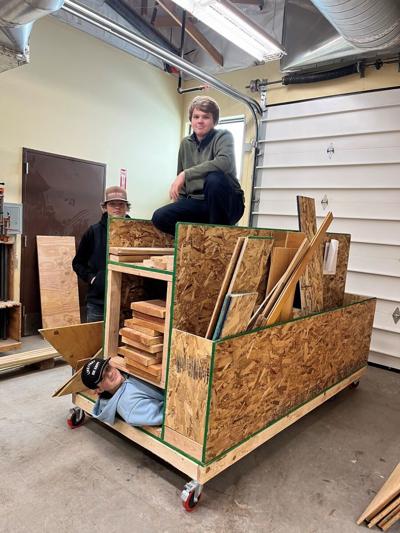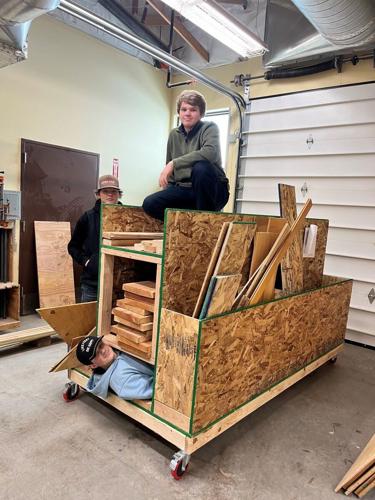DUFUR — How many of us wish we could get a feel for a potential career for a potential career pathway before we are ready to commit to it? Or to have the opportunity to try something new and practice a skill you’ve never tried before, just to see if you’d be any good at it? Even the chance to learn something that may be useful to you in everyday life? In Dufur School, the construction Career Technical Education (CTE) course aims to let students do just that.
Offering students the chance to learn real-world skills related to the construction industry, the course initially started up during the 2022-23 school year. It's one of the newest additions to Dufur’s growing CTE curriculum, which also offers courses in agriculture, early childhood education, health sciences and welding.
The program is taught by Leona Egeland, who initially started out at Dufur School as the CTE coordinator during the 2021-22 school year before starting up the program and becoming the construction teacher the next school year. She has also co-owned a plumbing business with her husband since 2006.
Initially graduating from Mt. Hood Community College with an associate degree in dental hygiene, she quickly realized the career pathway she’d been pursuing for so long was not something she was truly passionate about.
“I did a 13 years … investment in a career I ended up absolutely hating,” Egeland said. “I just wasn’t getting … that fulfilled feeling using my natural abilities and talents.”
Because of her experience, one of Egelands motivations in teaching the construction program is to allow students to try something new and get a feel for the trades, letting them get an idea of what they do or don’t enjoy before they graduate and commit to a career path.
“The main goal for me would be [for] a student to be coming to the realization of ‘Hey, this is a career path I should pursue,’ or ‘I enjoy this, but maybe I’ll find a different career that will support this as a hobby for myself,” Egeland said. “Some might get in the classroom and realize, ‘Hey, I really enjoy woodworking but I’m just not very good at it,' and that’s okay, that helps them make an informed decision as far as a career path that they want to pursue later on.”
In this three-year program, students in the construction CTE course begin with introductory classes to start getting familiar with different power and hand tools, reading plans and learning the math involved in construction. When students progress through the program, they can delve into plumbing, electrical, heating ventilation and air conditioning (HVAC) systems, cabinetry, or stick with a carpentry focus — learning about things such as framing, trusses and roof systems.
“It’s a great screening process for these students to have these opportunities within these programs to really kind of do some hands-on work and kind of test themselves and see what they’re capable of,” Egeland said.
While the program is still in its early stages, so far the construction students have taken on smaller projects for the school, including building a rolling rack for clothing donations, and building a giant Jenga set for the younger classrooms. “That’s been fun for the kindergarten class,” said Egeland.
A benefit Egeland noted about a course like construction is the opportunity for younger people to not only learn skills but gain experience with tools that they would not normally be able to train with at their age. According to the Oregon Bureau of Labor and Industries website, minor apprentices — apprentices learning a trade under the age of 18 — are prohibited from operating most power-driven tools, “including hoisting, woodworking and cutting/slicing equipment.”
As a business owner who has trained apprentices in the past, Egeland said she’s experienced the frustration of attempting to teach apprentices who not only are unfamiliar with basic parts of the trade but can’t utilize all the tools necessary to complete a job.
“I feel that that’s a huge disservice to our young youth,” Egeland said, “so the great thing about our current technical education program is it gives our students the opportunity to get exposed to these things that they normally wouldn’t be able to get exposed to."
Aside from the “hard skills” the construction course offers — the building, repairing and construction elements of the trade — Egeland also noted a large part of the course focuses on the “soft skills” as well.
“Your soft skills would be your employability skills. Are you reliable? Are you polite? Do you communicate well, can you listen and follow directions?” Egeland said. “A lot of this too is teaching these kids at a young age the value of work and the value of taking pride in your work."
With the program still in its second year, one component that Egeland is still working through is obtaining funding. According to Egeland, with the program being an unfunded mandate, she relies on grants — such as the Perkins V grant — and private donations to get the majority of the program’s funding.
“You have to figure out ways to generate funding … you have to be shameless, basically asking people for money,” Egeland said. “It's an unfortunate situation.
I don’t think people truly understand how education is funded in the state of Oregon,” Egeland added. “Your tax dollars basically go to keep the doors open and the lights on … [they] barely fund enough to have teachers that you need to offer core classes, and all this other stuff you got to get really creative with and sometimes you’re cutting a program so you can support another one.”
Egeland implores communities and local businesses to get involved with their local school CTE programs, not only at the benefit of the students but for themselves as well. “The community needs to get involved … whether that’s coming in and offering a little time to work with a student or throwing some financial support at a program,” Egeland said. “It's just like business, it’s all about relationships and that’s what makes these programs stronger … get involved, call the school, [it’s] a great opportunity for employers to try to … do some internships, offer some job shadows.
“I don’t expect any of my students to come out of the program and be like, ‘Oh, I can build a house, or ‘I’m going to plumb a home’ … it’s helping them point [to] their true north,” said Egeland. “It is my belief that any CTE program should strive to help students discover their natural giftings, talents and aptitudes, while at the same time reinforcing that fulfillment in your personal and professional life not only comes from using your naturals giftings in your work, but fulfillment is also obtained through taking pride in a job well done.”
For more information on the Dufur CTE program, visit the Dufur School District No. 29 website.
























Commented
Sorry, there are no recent results for popular commented articles.